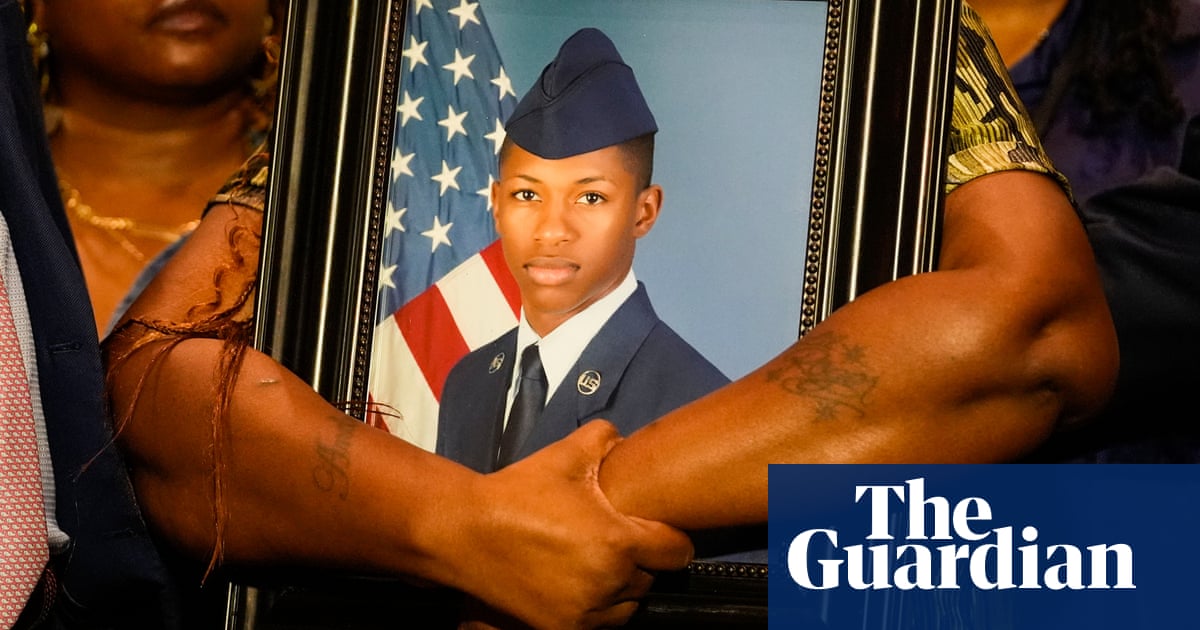
The family of a Black US air force airman who was fatally shot by deputies who burst into his apartment in the Florida Panhandle said Thursday that they want to correct a false narrative put forth by authorities about the encounter that led to his death.
The family of Senior Airman Roger Fortson planned to view body-camera video later in the day. Civil rights attorney Ben Crump, who is representing the family, said Fortson had not known it was sheriff’s deputies who were breaking into his apartment – “his castle” – and that he grabbed his “legally owned firearm” to protect himself.
Fortson’s mother, Chantemekki Fortson, walked into a news conference with Crump holding a framed portrait of her son in his dress uniform. She burst into tears as Crump spoke about her son’s death inside his apartment in Fort Walton Beach.
“My baby was shot up,” she said.
The Okaloosa county sheriff’s office planned to hold a news conference later Thursday afternoon. It has declined to identify the responding deputies or their races. Officials have said the Florida department of law enforcement and the local state attorney’s office will investigate the shooting.
Crump said deputies responding to a disturbance call burst into the wrong unit and fatally shot Fortson when they saw he had a gun. He said Fortson had grabbed his gun because he heard someone outside his apartment, got no response when he asked who was there and discovered the peephole on his door was blocked.
“For whatever reason, they thought he was a bad guy, but he was a good guy. He was a great guy. He was an exceptional guy,” Crump said.
Crump, a noted civil rights attorney, called the shooting “an unjustifiable killing” and said the sheriff’s office needed to own up to it instead of creating a counter-narrative that deputies were acting in self-defense.
“He was just in his apartment, minding his business,” Crump said of sheriff’s deputies. “They could have made sure they were at the right apartment. They had a duty to make sure they were at the right apartment before they busted in the door.”
The Okaloosa county sheriff’s office has not responded to an email or voicemail from the Associated Press seeking comment about Crump’s account.
In a statement last week, the office said a deputy responding to a call of a disturbance in progress at the apartment complex reacted in self-defense after encountering an armed man. The office did not offer details on what kind of disturbance deputies were responding to or who called them.
Crump said Fortson, originally from Atlanta, was shot six times and died at a hospital. The deputy who shot him was placed on administrative leave pending an investigation.
Fortson had constitutional rights to have the firearm and against unreasonable searches by the police, Crump said. He led family members and other attorneys in a chant of: “Clear Roger’s name.”
Crump said Fortson had always wanted to join the US air force and enlisted after graduating high school. He was based at the special operations wing at Hurlburt Field. He was a special missions aviator, and one of his roles was to load the gunship’s cannons during missions.
“He was living his dream. By doing so, he was going to make it better for his mother and siblings so they could have a better chance at the American dream,” Crump said.
Fortson had been talking to his girlfriend, who hasn’t yet been identified, on FaceTime when deputies burst into his apartment on 3 May, Crump added.
Without her, his family wouldn’t have known what had happened, he said. The girlfriend notified his mother, who drove to Fort Walton Beach to find out that her son was dead.
At the hospital, deputies approached Chantemekki Fortson, and she told them: “‘You guys have killed my baby. Just take me to my baby, please. I just want to see my child,’” she recounted at the news conference.
Fortson’s death draws striking similarities to those of other Black people killed in recent years by police in their homes, in circumstances that involved officers responding to the wrong address or responding to service calls with wanton uses of deadly force.
In 2018, a white former Dallas police officer fatally shot Botham Jean, who was unarmed, after mistaking his apartment for her own. Amber Guyger, the former officer, was convicted of murder and sentenced to 10 years in prison.
In 2019, a white former Fort Worth, Texas, officer fatally shot Atatiana Jefferson through a rear window of her home after responding to a non-emergency call reporting that Jefferson’s front door was open. Aaron Dean, the former officer, was convicted of manslaughter and sentenced to nearly 12 years in prison.